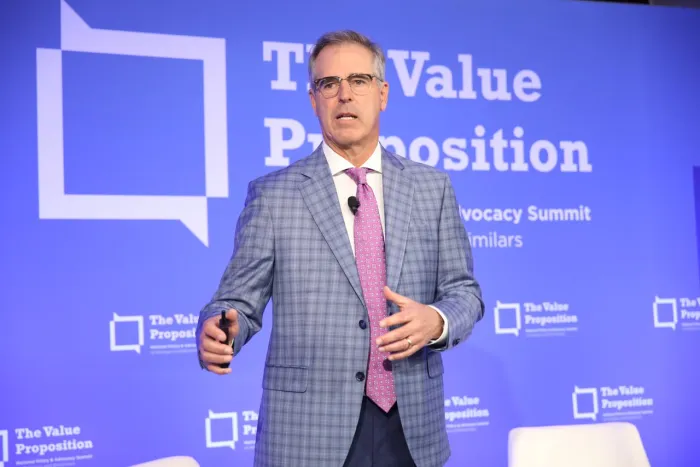Languishing in a hospital bed after surgery for life-threatening Crohn’s disease, San Diego Chargers’ Rolf Benirschke, dangerously underweight and saddled with ostomy bags at only 24 years old, couldn’t see the value of going on. But with top-notch medical care and the support of his family and teammates, Benirschke rallied. He ultimately returned to the NFL, where he played seven more seasons and was named NFL Man of the Year.
His recovery story inspired attendees at this week’s fourth annual National Policy & Advocacy Summit on Biologics and Biosimilars, held in Washington, DC. And it reinforced for the audience of health care providers, patients, advocates and policymakers the importance of access to innovative medicine.
Dubbed “The Value Proposition,” the event was convened by the Institute for Patient Access and co-hosted by the Alliance for Patient Access and the Biologics Prescribers Collaborative. As AfPA Chairman David Charles, MD, outlined in his opening remarks, the organization envisions a patient-centered health care system that reveres the physician-patient relationship and holds access as the highest aim. The result is better health outcomes, Dr. Charles explained, and eliminating avoidable costs to patients and the health care system. Dr. Charles acknowledged that vision as the organization’s ultimate “value proposition,” and the thematic framework of this year’s event.

Diverse concepts of value unfolded during the day-long event.
Uptake, Education & Non-Medical Switching
The value of innovative medicine and of choice among therapies emerged as a central theme. In a panel discussion of biosimilar uptake, IQVIA’s Murray Aitken noted that the European Union has moved biosimilars to market more quickly than the United States has, resulting in more approved therapies. But approval doesn’t equate to availability. Europe’s tender system, a winner-take-all approach to contracting between health care systems and drug manufacturers, can result in “forced switching issues” for patients, Aitken explained.

And forced switching doesn’t sit well with patients and health care providers. As panelist Aline Charabaty, MD, of the American Gastroenterological Association noted, “Patients don’t want to change anything once they find the drug that works for them.” Dr. Charabaty expressed physicians’ collective concern that patients could be switched without their physician’s knowledge or consent, and emphasized that biosimilar options were welcome as long as physicians retain control of treatment decisions.
Part of that control means having comprehensive data on biosimilars, a fact of which the Food and Drug Administration’s Sarah Ikenberry is keenly aware. Recent FDA research revealed that physicians are focused on “what is the data, what are the approval standards, what is FDA looking at,” Ikenberry explained.
The panel, moderated by The Pink Sheet’s Nielsen Hobbs, agreed that the combination of education efforts, additional biosimilar approvals and a steady influx of peer-reviewed data would continue to build physician and patient confidence and increase treatment options.
The topic of non-medical switching emerged again during AfPA Executive Director Brian Kennedy’s presentation of a recent AfPA study on the issue. Describing switching as “penny-wise, pound foolish,” Kennedy explained how disruptions in treatment can drive up costs through hospitalizations, doctors visits and extra labs tests. He also noted the far-reaching impact of switching on the lives of patients, who reported emotional stress, lagging productivity at work and the inability to handle caregiving responsibilities at home.

Overcoming Access Barriers
But non-medical switching isn’t the only access barrier facing patients and providers. Insurers often hamper high-cost, high-value therapies like biologics with utilization management tools, seeking to curb costs by limiting patient access.
In a panel discussion on talking with health plans, Ryan Gough of the Partnership to Advance Cardiovascular Health and Stacey Worthy of the Aimed Alliance conveyed their respective organizations’ efforts to improve patient access. Gough described coupling data with patient testimonials to pressure insurers with high rates of rejection for heart patients prescribed cholesterol-lowering PCSK9 inhibitors.

Worthy outlined her organization’s efforts at educating employers, the largest purchaser of health insurance, about the benefits of comprehensive coverage. By outlining the benefits of access in terms of how employers can “increase productivity, decrease absenteeism, decrease medical expenses under health plan,” Worthy explained, employers are more willing to improve patient access.
Cost-Savings Proposals
Access issues also dominated the day’s final panel discussion, which explored proposals for reducing health care costs. The Trump administration’s idea of shifting Medicare Part B drugs to Part D, the prescription drug plan, for instance is “one of those ideas people hoped has died on the vine,” explained Kevin Kirby of The Moran Company, “but is still in the president’s most recent budget proposal.” As Madelaine Feldman, MD, president of the Coalition of State Rheumatology Organizations noted, some patients “can’t afford Part D” because it’s excluded from the supplemental Medicare coverage that patients use to access Part B medications.

The group also examined the Trump administration’s proposal for an international pricing index, which AfPA’s Gavin Clingham described as “one of the larger and more controversial” ideas put forth by the administration. Panelists expressed concern with the scope of the project, which would affect 50 percent of Medicare providers, and impact patient access.
The cost-saving concept that most resonated with panelists and audience members was the administration’s recent proposal to end secretive rebate negotiations between pharmacy benefit managers and manufacturers in favor of direct-to-patient drug discounts. “This would disrupt the entire system for Part D,” Dr. Feldman predicted, adding, “In three-to-five years this could trickle down to the commercial [health plans]. Competition could bring prices down.”
Access & Advocacy
Panelists agreed that lowering costs to patients was a surefire way to improve access to advanced medicine like biologics and biosimilars. And the value of those medicines could hardly be overlooked through the day’s discussions.
From physician’s descriptions of their patients’ remarkable progress on biological therapies to Rolf Benirschke’s marvel at the transition from steroids to “unbelievable biologics” for Crohn’s and inflammatory bowel disease, the value of improving patients’ access to biologics and biosimilars loomed large. Benirschke encouraged advocates and physicians in the room to continue their work, allowing advocacy to “fuel you like it fuels me.”
Social media activity from the day is available at #BiologicsSummit2019.




